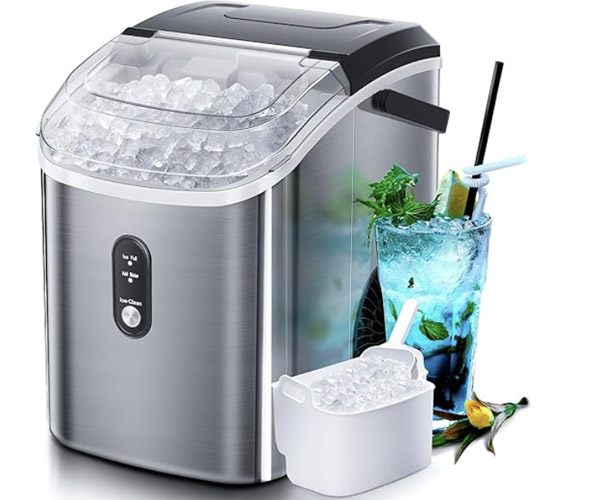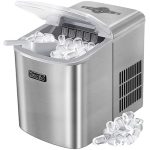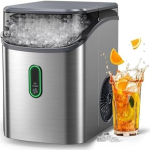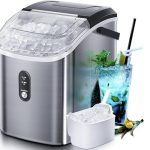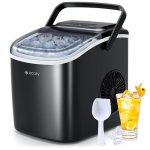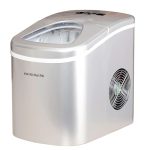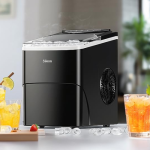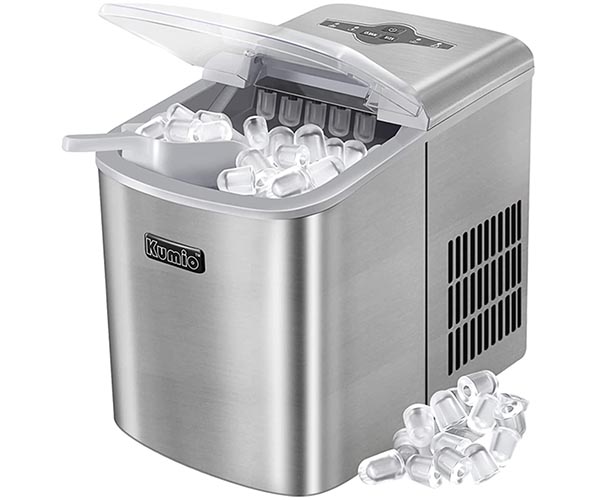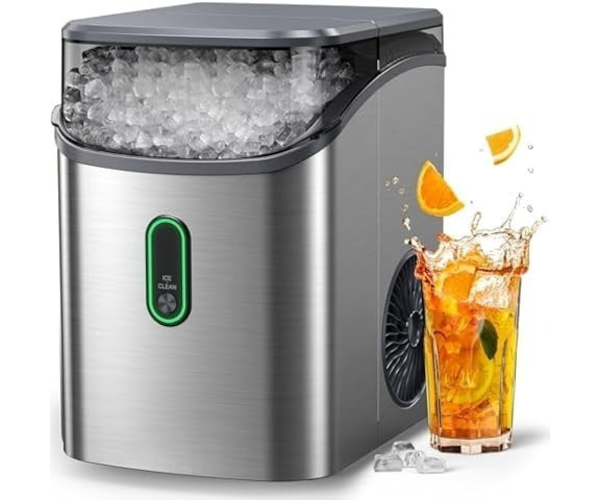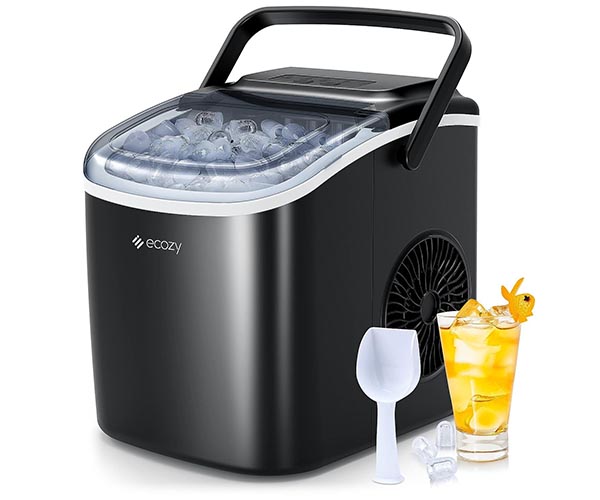Introduction
Planning a large event comes with its own set of challenges. From catering to logistics, every detail needs to be perfect to ensure the event runs smoothly. One often overlooked but critical aspect of event planning is ensuring a reliable supply of ice. Whether it’s a corporate event, wedding, festival, or any other large gathering, having a dependable ice maker is essential to meet the demands of guests and keep everything running cool. This article delves into the key considerations for choosing and using a water ice machine or countertop ice maker commercial units, offering valuable insights for event planners and organizers.
The Importance of Reliable Ice Makers for Large Events
The role of ice in large events cannot be underestimated. It’s not just about keeping drinks cold—ice is used for food preservation, medical needs, and more. A shortage of ice can quickly turn a well-planned event into a logistical nightmare, causing stress for organizers and dissatisfaction among guests. That’s why investing in a reliable water ice machine or countertop ice maker commercial is crucial. These machines provide the necessary capacity and efficiency to handle large-scale ice demands, ensuring that you never run out of ice at a critical moment.
Purpose of the Article
This guide aims to help event planners and organizers make informed decisions when selecting an ice maker for large events. By understanding the features, types, and operational tips for ice makers, you can ensure your event runs smoothly without any ice-related hiccups.
Target Audience
This article is tailored for event planners, caterers, wedding organizers, and corporate event managers who are responsible for the logistics of large gatherings. Whether you’re hosting a grand wedding or a major corporate conference, the insights provided here will help you choose the best water ice machine or countertop ice maker commercial units for your needs.
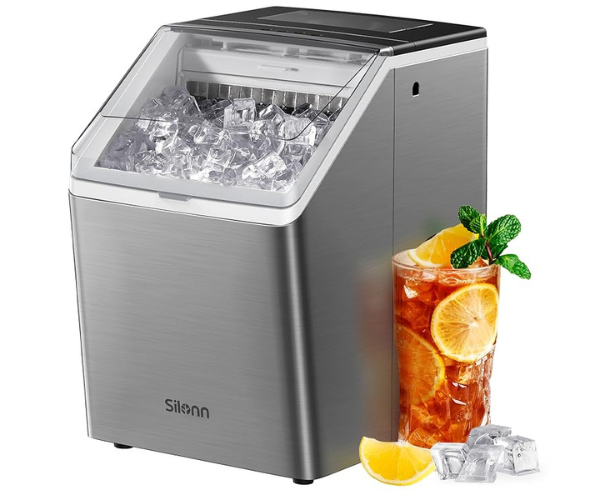
Understanding Ice Makers for Large Events
What Defines a ‘Large Event’?
A large event is typically defined by its scale and the number of attendees. Events such as weddings, conferences, and festivals often fall into this category. These events generally have a guest count that exceeds 100, and in many cases, the numbers can reach into the thousands. Understanding the scope of your event is crucial for estimating ice requirements. For instance, a wedding with 200 guests might need significantly less ice than a music festival hosting 5,000 attendees over several days.
The demand for ice at large events is influenced by several factors, including the type of event, the weather conditions, and the specific uses of ice. For example, a summer outdoor wedding will require more ice to keep beverages cool than a winter indoor conference. Additionally, some events may require ice for more than just drinks, such as for food displays or medical needs. Understanding these variables will help you accurately estimate your ice needs.
Key Features of an Ice Maker for Large Events
When selecting an ice maker for a large event, it’s essential to consider several key features. These features will ensure that the ice maker can handle the demands of your event without failure.
- High Production Capacity: The ice maker should be capable of producing large quantities of ice quickly. This is especially important for events where ice demand is high throughout the day. Look for machines that can produce at least 100 pounds of ice per day, depending on your event size.
- Fast Ice-Making Cycles: Speed is crucial in large events. The ice maker should have a fast cycle time to keep up with the continuous demand. Machines that can produce ice in under 10 minutes per cycle are ideal.
- Durability and Reliability: A reliable ice maker is one that can run continuously without frequent breakdowns. Opt for machines built with high-quality materials and components designed to withstand heavy use.
- Portability and Ease of Use: Depending on the event, you may need to move the ice maker to different locations. A portable unit with wheels and handles can be a great asset. Additionally, the machine should be easy to operate, even for those who are not technically inclined.
Types of Ice Makers Suitable for Large Events
There are several types of ice makers to consider, each with its own advantages depending on the event’s needs:
- Modular Ice Makers: These machines are designed to produce large quantities of ice and are often used in commercial settings. They consist of an ice machine head, which produces the ice, and a separate storage bin where the ice is stored. Modular ice makers are ideal for events where high-volume ice production is required, and they can produce up to 1,000 pounds of ice per day.
- Undercounter Ice Makers: These units are compact and designed to fit under a counter, making them a good choice for events with limited space. While they may not have the same high production capacity as modular units, they are suitable for smaller events or as supplementary machines.
- Portable Ice Makers: For events where flexibility and portability are key, a portable ice maker is the best option. These machines are smaller and can be easily transported to different locations within the event space. They typically produce around 20 to 50 pounds of ice per day, making them suitable for smaller gatherings or as a backup to larger machines.
Common Ice Types and Their Uses
Understanding the different types of ice and their specific uses can help you choose the right ice maker for your event:
- Cubed Ice: This is the most common type of ice used in beverages. It’s clear, solid, and melts slowly, making it perfect for keeping drinks cool without watering them down. Cubed ice is also versatile and can be used for a variety of other purposes, such as cooling food and displaying seafood.
- Nugget Ice: Also known as “chewable ice,” nugget ice is softer and smaller than cubed ice. It’s popular in healthcare settings because it’s easy to chew and safe for patients. At events, nugget ice is great for cocktails and mixed drinks, where it absorbs flavors and creates a refreshing experience.
- Flake Ice: Flake ice is thin, soft, and easily moldable, making it ideal for food displays and preservation. It’s commonly used in supermarkets to display fresh produce or seafood, but it can also be useful at events for keeping salads, fruits, and other foods cool.
How to Choose the Right Ice Maker
Assessing Event Needs
Choosing the right ice maker starts with assessing the specific needs of your event. This involves determining how much ice you will need and what types of ice will best serve your purposes. Here’s a step-by-step approach to help you make an informed decision:
- Estimating Ice Volume Requirements: Calculate the total ice needed based on the number of guests and the duration of the event. A general rule of thumb is to estimate 1 to 2 pounds of ice per person for beverages alone. For events that last several hours or span multiple days, consider increasing this amount.
- Estimating Peak Ice Demands: Identify peak times during the event when ice demand will be highest. For example, during meal times or cocktail hours, ice demand may spike. Ensure the ice maker can keep up with these peak periods without running out.
Considerations for Power and Water Supply
The availability of power and water supply at the venue is a crucial factor in choosing an ice maker. Here are the key considerations:
- Power Supply: Check the power requirements of the ice maker. Large commercial ice makers typically require a dedicated electrical circuit. Ensure that the venue can accommodate this, and consider using generators for outdoor events.
- Water Supply: Ice makers need a steady water supply to function. If the event is held outdoors or at a location without direct water access, you may need to arrange for water tanks or portable water supplies. Additionally, check the water quality, as impurities can affect ice production and quality.
Portability and Mobility
The size and layout of the event venue will determine the importance of portability in your ice maker. If you need to move the machine frequently or place it in different locations throughout the event, a portable ice maker or a unit with casters is ideal. Portability also matters for events held in multiple locations, where the ice maker needs to be transported between sites.
Noise Levels
While ice makers are essential, they can be noisy, which may be disruptive in certain event settings. Consider the noise level of the ice maker, especially if it will be placed near guests. Look for machines with quieter operation, or plan to place the ice maker in a less intrusive location.
Ease of Maintenance and Cleaning
A reliable ice maker should be easy to maintain and clean. Machines with self-cleaning features can save time and ensure that the ice remains sanitary. Regular maintenance is also important to prevent breakdowns during the event. Ensure that the machine’s parts are easily accessible for cleaning and that the manufacturer provides clear maintenance guidelines.
Energy Efficiency
Energy-efficient ice makers can help reduce operational costs, especially for events that last several days or involve multiple machines. Look for models with energy-saving features, such as timers and auto shut-off functions. Energy-efficient machines not only save on electricity costs but also reduce the environmental impact of the event.
Top Recommended Ice Makers for Large Events
Detailed Reviews and Comparisons
When selecting an ice maker for large events, it’s important to compare different models based on their features, reliability, and user feedback. Below are some top recommended water ice machine and countertop ice maker commercial units for large events:
- Brand 1: [Model Name]
- Features: This model boasts a high production capacity of 500 pounds per day, making it ideal for large-scale events. It has a fast cycle time of 8 minutes per batch and comes with a durable stainless steel body.
- Pros: High efficiency, durable construction, large storage bin.
- Cons: Requires a dedicated water line and electrical circuit.
- Brand 2: [Model Name]
- Features: A versatile undercounter ice maker that fits easily in tight spaces. It produces 150 pounds of cubed ice per day and has a built-in drain pump for easy water disposal.
- Pros: Compact design, easy installation, quiet operation.
- Cons: Lower production capacity compared to modular units.
- Brand 3: [Model Name]
- Features: This portable ice maker is perfect for smaller events or as a backup. It produces 50 pounds of nugget ice per day and is equipped with a user-friendly control panel.
- Pros: Lightweight, easy to transport, quick setup.
- Cons: Limited ice production, not suitable for very large events.
Customer Testimonials
Real-world feedback from event organizers who have used these machines can provide valuable insights. For instance, an event planner who used Brand 1 at a 500-guest wedding reported that the machine “kept up with the demand flawlessly, and the ice quality was top-notch.” Another organizer who chose Brand 3 for a smaller corporate event appreciated its portability and ease of use, noting that it “saved the day when the main ice maker broke down.”
Price vs. Value
When evaluating ice makers, consider the cost in relation to the value they offer. While high-end models with large capacities may have a higher upfront cost, they often offer better reliability and lower long-term maintenance costs. On the other hand, if your event doesn’t require massive ice production, a more affordable portable model may suffice.
Availability and Warranty
Always check the availability of the ice maker well in advance of your event. Some models may have longer lead times, especially if they are in high demand. Additionally, ensure the machine comes with a comprehensive warranty and reliable customer support. A strong warranty can save you significant stress and expense in case of a malfunction during the event.
Practical Tips for Using Ice Makers at Large Events
Pre-Event Preparation
Preparation is key to ensuring your ice maker runs smoothly during the event. Start by setting up the ice maker at the venue a day before the event to ensure it’s functioning correctly. If possible, begin producing ice in advance to build up a reserve. This is especially useful for events with a high initial demand, such as cocktail receptions.
Check that all connections, including the power and water supply, are secure. If your ice maker has a storage bin, make sure it’s clean and ready to hold ice. For portable units, position them in areas that are easily accessible to staff but not in the way of guests.
During the Event
Throughout the event, it’s important to monitor the ice supply regularly. Assign a staff member to check the ice levels and replenish as needed. If your event spans several hours or multiple days, plan to take breaks to allow the ice maker to catch up on production. This will prevent any shortages during peak demand times.
Consider setting up multiple ice stations to distribute the load. This not only ensures a steady supply of ice but also reduces the risk of long lines forming at a single station.
Post-Event Care
After the event, take the time to properly shut down and clean the ice maker. Remove any remaining ice and drain the water line if necessary. For machines with self-cleaning functions, run the cleaning cycle to flush out any residue. Proper cleaning and maintenance after each event will extend the life of the machine and ensure it’s ready for future use.
If you’re storing the ice maker for an extended period, make sure it’s in a dry, cool place to prevent any damage. For portable units, consider covering them to protect against dust and debris.
Troubleshooting Common Issues
Common Ice Maker Problems and Solutions
Even the best ice makers can encounter issues, especially during the high demands of a large event. Here are some common problems and their solutions:
- Ice Maker Not Producing Ice: This can be caused by a variety of issues, including a clogged water filter, a faulty water inlet valve, or a problem with the temperature sensor. Start by checking the water supply and filter. If these are not the issue, consult the user manual or contact a professional for repairs.
- Ice Quality Issues (Too Soft, Cloudy, etc.): Poor ice quality can result from dirty water, improper freezing temperatures, or mineral buildup in the machine. Regular cleaning and using filtered water can improve ice quality. If the ice is still not up to standard, it may be necessary to descale the machine.
- Water Leakage: Leaks are often due to loose connections or damaged water lines. Inspect all connections and tighten them if necessary. If the water line is damaged, it should be replaced immediately to prevent further issues.
When to Call for Professional Help
While some issues can be resolved with basic troubleshooting, others may require professional intervention. If your ice maker stops working completely, makes unusual noises, or shows signs of electrical issues, it’s best to contact a certified technician. Attempting to repair complex problems without the proper expertise can lead to further damage and void the warranty.
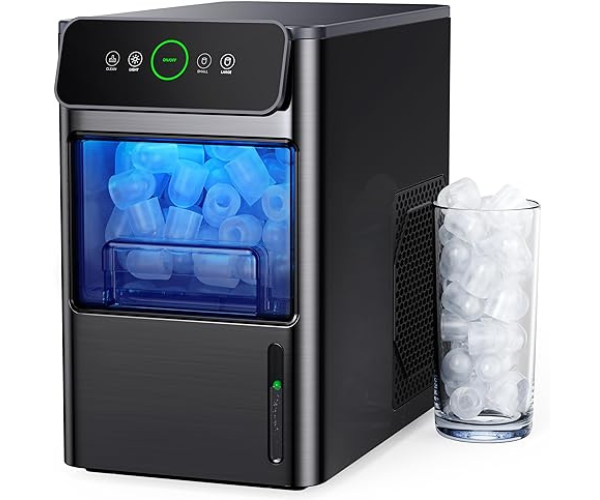
Safety Considerations
Safe Operation of Ice Makers
Operating an ice maker at a large event requires attention to safety. Here are some key safety tips:
- Electrical Safety: Always use a properly grounded outlet to power the ice maker. Avoid using extension cords, as they can overheat and cause electrical fires. If the event is outdoors, make sure the ice maker is protected from the elements and that all electrical connections are weatherproof.
- Safe Handling of Ice and Hygiene Standards: Ice is considered food, so it’s important to handle it with care to avoid contamination. Ensure that all staff members handling ice wear gloves and use clean scoops. The ice storage bin should be kept closed when not in use to prevent contamination.
Environmental Considerations
Sustainability is increasingly important in event planning. Consider the environmental impact of your ice maker by managing water waste and energy use:
- Managing Water Waste: Efficient water use is crucial, especially in areas where water is scarce. Choose ice makers that recycle meltwater back into the production cycle. For large events, consider using machines with water-saving features.
- Energy Conservation: Opt for energy-efficient models to reduce electricity consumption. Turning off the ice maker during non-peak times can also conserve energy. Additionally, using an ice maker with an automatic shut-off feature can prevent unnecessary energy use.
Alternatives to Owning an Ice Maker
Renting vs. Buying
For event planners who do not frequently host large events, renting an ice maker might be a more cost-effective option. Here’s a comparison:
- Pros of Renting:
- Lower upfront costs.
- No maintenance responsibilities.
- Access to the latest models.
- Cons of Renting:
- Higher long-term costs if renting frequently.
- Limited availability during peak event seasons.
- No control over the machine’s condition.
If your events are infrequent or vary in size, renting allows you to adjust your equipment needs without the commitment of ownership. However, for planners who host regular large events, purchasing may offer better value in the long run.
Hiring a Full-Service Ice Vendor
Another alternative to owning or renting an ice maker is to hire a full-service ice vendor. These vendors provide ice-making services on-site, delivering ice as needed throughout the event. This option is ideal for extremely large events or when space and logistics make it impractical to operate an ice maker on-site.
When choosing a vendor, ensure they have a reliable track record and can meet your event’s specific needs. It’s also important to verify their compliance with health and safety standards.
Case Studies
Successful Use of Ice Makers in Large Events
To illustrate the importance of choosing the right ice maker, here are a few case studies:
- Corporate Event with 500 Guests: The event planner chose a modular ice maker capable of producing 600 pounds of ice per day. This machine was essential for keeping drinks cool during multiple cocktail receptions. The planner reported that the machine performed flawlessly, and there were no issues with ice supply even during peak periods.
- Large Wedding with 300 Guests: For this summer wedding, the organizer selected an undercounter ice maker that produced 200 pounds of cubed ice per day. The machine’s compact size allowed it to be placed discreetly behind the bar, ensuring a continuous supply of ice for drinks. The wedding was a success, with guests enjoying cold beverages throughout the event.
- Outdoor Festival with 5,000 Attendees: The festival organizer opted for a combination of rented modular ice makers and portable units. This setup provided flexibility and ensured that ice was available at multiple locations across the festival grounds. The organizer praised the reliability of the machines, noting that they played a crucial role in the event’s success.
Lessons Learned
From these case studies, it’s clear that the key to a successful event is choosing the right ice maker for your specific needs. Consider factors such as event size, location, and the type of ice required. Proper planning and preparation can prevent ice shortages and ensure that your event runs smoothly.
Conclusion
Recap of Key Points
Reliable ice makers are essential for the success of any large event. From weddings to corporate functions, the right water ice machine or countertop ice maker commercial unit can make all the difference in ensuring guests are satisfied and operations run smoothly. By understanding the features, types, and operational tips discussed in this article, event planners can make informed decisions that lead to successful events.
Final Recommendations
When selecting an ice maker, consider the specific needs of your event, including ice volume, type, and venue logistics. Invest in a machine that offers the right balance of capacity, portability, and reliability. And don’t forget to plan for maintenance and troubleshooting to avoid any last-minute issues.
Call to Action
If you’re planning a large event and need expert advice on selecting the best ice maker, reach out to our team for personalized recommendations. We’re here to help you find the perfect solution to keep your event cool and your guests happy.
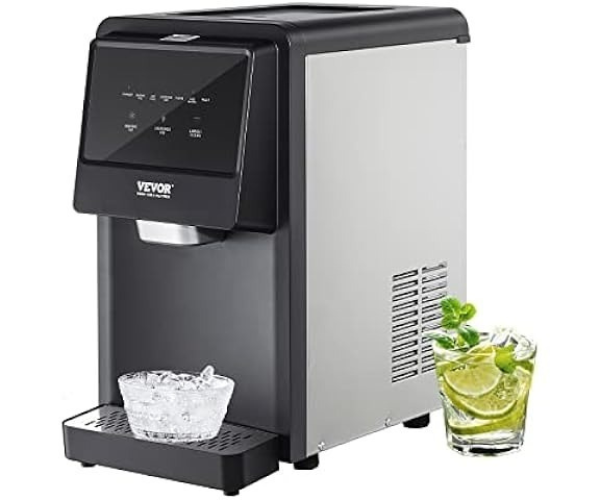
FAQs
How much ice do I need for my event?
The amount of ice needed depends on the number of guests and the type of event. A general guideline is to estimate 1 to 2 pounds of ice per person, but this can vary based on factors like weather and the specific uses of ice at your event.
What is the best type of ice maker for an outdoor event?
For outdoor events, portability and durability are key. A portable ice maker or a rugged modular unit with a high production capacity is typically the best choice. Ensure the machine is suitable for outdoor conditions and can be powered efficiently.
Can I rent an ice maker instead of buying one?
Yes, renting an ice maker can be a cost-effective option, especially for one-time or infrequent events. It allows you to access high-quality machines without the commitment of ownership. However, if you host regular large events, buying may be more economical in the long run.
How long does it take for an ice maker to produce a batch of ice?
The cycle time varies by model, but most commercial ice makers produce a batch of ice in 7 to 15 minutes. Larger machines with higher capacities may have slightly longer cycles, but they produce more ice per batch.
What should I do if my ice maker stops working during the event?
If your ice maker stops working, first check the power and water supply. If the issue persists, refer to the troubleshooting guide in the user manual. For more serious problems, it may be necessary to contact a professional technician. Having a backup ice maker or an alternative ice source is also a good contingency plan.

